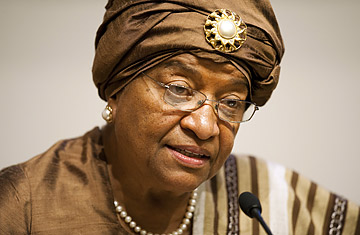
Liberian President Ellen Johnson Sirleaf, who is running for re-election, speaks at the U.S. Institute of Peace in Washington on June 24, 2011
The following interview was carried out a few weeks before Ellen Johnson Sirleaf was announced as one of the three winners of the 2011 Nobel Peace Prize.
Liberian President Ellen Johnson Sirleaf won global recognition as the first woman elected head of state in Africa. Now running for re-election, she spoke to TIME's Karen Leigh at her presidential mansion in the capital, Monrovia.
Why run for a second term?
Simply because we need to ensure that there's no reversal of the many gains that we have made. It has taken us almost five years to repair a broken economy, a broken country. When we came in, we didn't realize the intensity of the destruction — a collapsed economy, dysfunctional institutions, no discipline, destroyed infrastructure. We've done all the basics — mobilized resources, settled the debt, passed new laws, built the institutions and the capacity. Liberia just needs to go through this one political transition and it can really take off. Everything's in place now. We cannot afford to put the country in the hands of someone that lacks the experience.
Any surprises from the campaign?
The Saturday turnout. I knew we had support. But the level of the support, the enthusiasm, was a pleasant surprise. It was a show of appreciation. I was very satisfied.
Any worries?
We have been concerned about some political leaders who are threatening violence, mass action and all. But I think that's just war drums. I think the majority of the Liberian people want peace.
You originally said you would only serve one term. When did you decide to go for two?
I kept resisting because I think I've done enough in my lifetime. I could retire easily and feel like I've been there, I've done that. And I realize there has to be a generational transition. The young people of this country have to take over. I will prepare a few of them so that as I move out, they will take over and ensure continuity in the rebuilding of the country. But the persuasion was so strong from partners, from international institutions, particularly from the Liberian people.
Is education your big achievement?
Absolutely. Most of our young people were denied an education during the many years of conflict. We enforced compulsory primary education, and enrollment in public schools more than doubled. We stressed girls' education because girls have been neglected for so long. The most permanent thing is an education. They can steal your car, they can burn your house, [but what] you have in your head, nobody can take away from you.
And the biggest challenge that remains?
Getting young people employed ... [people] who were child soldiers. And to continue our infrastructural development because you're not going to industrialize if you don't have enough power and roads.
What do you say to those who say your gender is the key to your presidency?
Gender's an important part of our agenda, there's no question about it. [Women] did not have a voice before. Today we know they listen to us. Illiterate market women ... many of them can now read and spell their names. All girls know that they can be anything now. That transformation is to me one of the most satisfying things. [Having a woman President] sends a signal. Women just all of a sudden come alive because they have a role model, because they know it's possible. I expect some places in the Middle East where women have been contained will see them emerge after this Arab Spring.
Does your past association with [indicted war criminal and former President] Charles Taylor still hurt you?
That was the key issue in 2005, and the voters rejected it because the voters know the truth. The contribution to Taylor was [from] an institution in the U.S. of which I was a part. Yes, I made a personal contribution. But so did hundreds of other Liberians. And the minute we found Taylor's motives were now what we thought, I came home, I fought him, I lost, I didn't give up.
What keeps you up at night?
I work hard, I work late, I have nothing on my conscience. When I go to bed, I sleep.
Would you ever consider a third term?
Absolutely not. My age would not allow it. The constitution forbids it. The Liberian people would not tolerate it. Out of the question.
